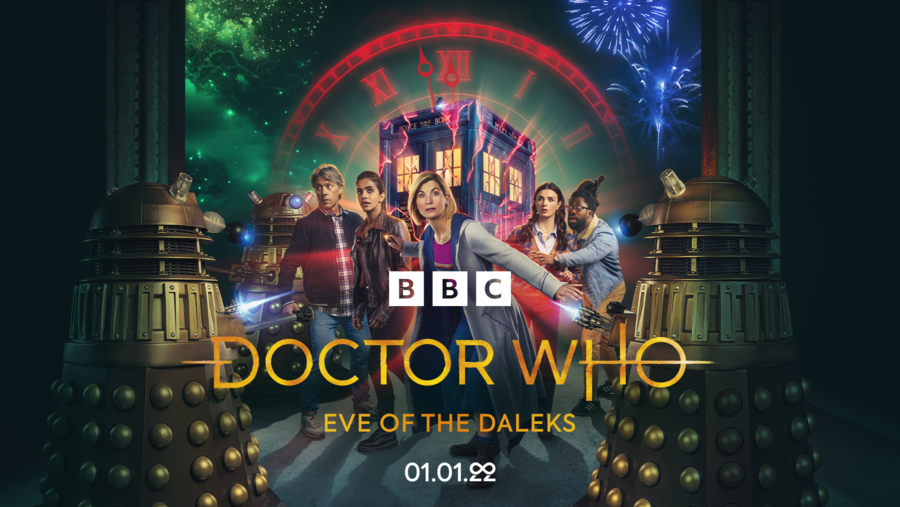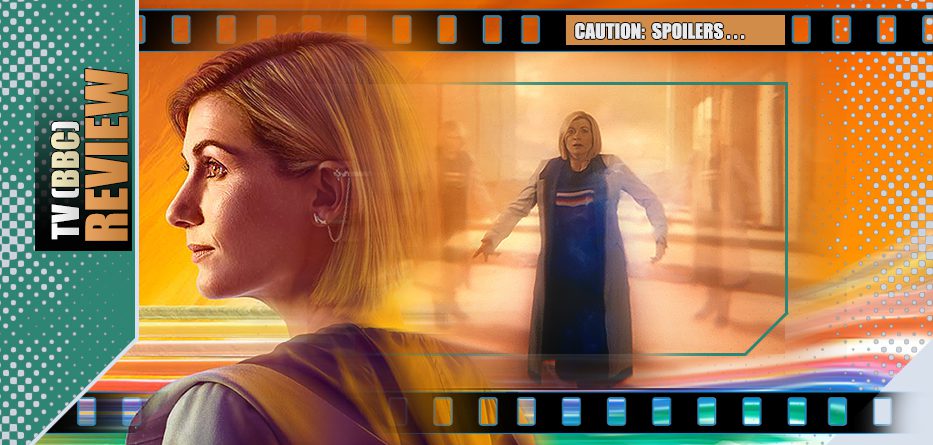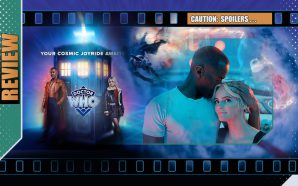The Universe is dying and the Doctor finds herself stuck on the Division craft – or does she? Split through time and space, she can offer only brief moments of support to her companions and allies. But with the Sontarans offering a strategic alliance with the remaining Daleks and the Cybermen and time literally running out, what hard choices will the Doctor have to make about her past, her future and the oncoming storm?
*spoilers*
Not with a potential new universal big bang, then, but with a technobabble-filled whimper full of bizarre segues, superfluous characters and creakingly-contrived exposition does Doctor Who: FLUX come to a stumbling close. I really wanted Flux to be a turning-point for this era of the Doctor, but for whatever reason, it proved to be a a careering car with the driver far too focused on editing the rear-view mirror than where it was heading.
We wondered last week if it was now even possible to tie-up the considerable number of loose-knit loose-ends. Though Chris Chibnall does indeed dash around trying to join the abstract dots of his own making, the only thing it succeeds in doing is diluting all the elements that – had they stood separately and with tighter writing – might have had real power, but together seem like a mess. All through Chibnall’s run to date I’ve tried to give it the benefit of the doubt, musing that there might be a great finish in the works or that, perhaps, Who had moved on and I was simply no longer in step with it. That’s the beauty and the curse of a generational show like Doctor Who. It could still be true, but the fault-lines within the recent run still stand out sharply.
I have little time for those who seem to salivate failure or revel in the more venomous corners of fandom (rather than considered critique that also exists) and take no joy from others’ mis-steps, but Flux was just an astonishing example of poor quality-control (excusing, perhaps, some of the VFX that book-ended the run), of rushed writing, inferior homages to previous era highpoints and likely even more rushed rewriting. Whether it be down to pandemic restrictions or the ever-decreasing circles and personal outlook of the creatives behind it, Flux was not, in the end, anything close to a coherent story – it was a set of random vignettes, monologues and scenes selected from a scrabble pouch of ‘greatest hits’ from other eras and then quickly thrown together in the hopes of coherence, all made more frustrating by seeing all the brief glimpses of real potential among those many homage’d moments. Moffat’s ambitious era had needed convenient holes to sustain it, but Chibnall’s reign seems to have chasms as punctuation and mythology as lip-service decoration.
Whittaker herself (or herselves given the work-load this time), pulls quadruple time and is being given more to do here than her seasons to date. It’s still difficult to shoulder the gurning silliness with the more serious, dramatic weight of possible failure and the script never allows her the balance needed, though to her credit she’s doing her best and there are moments when you see what her era could have been. The Doctor, sometime mysterious, sometimes dangerous, has always been on the side of the under-dog, of hope, of altruistic chaos… always kind (well, -ish), never cowardly. (Capaldi’s still-astonishingly good speech on the stupidity of genocidal conflict resonates as much as ever). But Chibnall, whose understanding of what makes the Doctor tick seems to be evermore tenuous by the passing of each episode, puts her in a contrived situation that paints him and the character into a narrative cul-de-sac. The universe can possibly be saved by letting the Sontarans wipe out the Cybermen and the Daleks, with the potato-headed ego-warriors having dominion over what’s left… or the universe can be destroyed to make way for a new one. At best/worst, it’s a cosmic dilemma that would give one pause for thought and in past incarnations, the Time Lord would have strategised or cheated their way out of the problem. That’s good drama. But here Chibnall’s Doctor doesn’t even blink, letting the amassed Cyber and Dalek fleets be wiped out and then plans to let the Sontarans be dusted from existence by the Flux as well all with a few quips, one-liners and monologuing amongst herselves. Less Genesis of the Daleks musings, more genocide as a punchline. And when the episode comes to its end…. with a tattered, bruised and battered universe surviving but with a few trillion planets and lives lost thanks to the Flux (something created solely as a result of the Doctor interfering with Division’s plans – maybe, still not clear on that logic) and no magic reset-button engaged, is it a time for somber, dour considerations of the consequences… nah, let’s go have some fun, fam!
Amid the huge implications to the show’s mythology that are treated as ominous and profound – but which can be tied off in quick a ‘it got better’ bow later – the real failure here is in the influx of characters that play supporting roles throughout. At least promising on a visual level, Swarm and Azure were introduced as the characters with a secret-history to the Doctor and a sense of building towards a ‘final’ confrontation that the Doctor couldn’t comprehend. Instead? They turn out to be the damp squibs of an inferior bonfire night, shiny and sparkly, but only as much as the cheapest of decorations on last year’s Christmas tree. We’ve meant to think they were the big bads, but all they’ve done is swan around pontificating, posturing and preening and in this last gasp, they’re revealed – at least, I think – as a strictly middle-management menace to the personification of Time itself… one that – usefully – looks just like Swarm. The Doctor doesn’t even defeat them, she’s their talkative, exposition plaything and victim throughout – Time itself does the dirty deed with an easy flick of its chronological wrist and yet spares the Doctor with foreboding hints about ehr upcomign specials. Both these skully-visaged pantomime villains have been utterly wasted, used as punctuation and glue, but in particular the pointless character of Azure could be snipped out of the entire run – her lines given to her cohort – and exactly nothing would change. Her origin, from the first-episode reveal onwards, still makes no narrative sense and she makes no real contribution to any element of story or pace. It’s almost as if they were being rewritten after every page with side-notes proclaiming ‘Look shiny. Sounds intimidating. Must do *something* important with them – later!‘
There are some high-concepts here that could have worked well given the right care and attention and there’s every indication that a return to ‘serial’ story-telling might help the story format in future. I liked the idea of the limitless Passenger containing the Flux, but isn’t that what Chibnall did by randomly killing a spare Tardis with Daleks inside just a short while ago? Ambition is fine, but a sense scale without a sense of structure is merely folly. Flux feels like a tv show or comic where the Powers-That Be have suddenly informed the reach-for-the-stars creatives that the budget’s been cut in half and they’re being cancelled AND they have to wrap up ALL their stories immediately – but here there’s no such excuse. The main characters consistently get to do the ‘tell’ rather than the ‘show’ – to the point where I literally said ‘I have no idea what’s happening or what that meant!‘ several times during the final hour and the supporting players all deserve better. Was Jericho, bolstered by marketing showing him with two watches, one of the fob-variety, a Time Lord? Online forums buzzed on the significance of Vinder and Bel. Was Bel’s baby a time-torn Doctor? After promises from Chibnall that ‘Vinder will break your heart‘, would Vinder die sacrificing himself? No… just wild fan-speculation to all of the above, which would be fine if the actual resulta were something interesting. While both Vinder and Bel made a brief impression due to the quality of the actors playing them, those characters were not well serviced at all. With neither given as much room to deliver as they needed, Vinder simply darted from place to place with very little back-story and Bel’s little-one was more an excuse for Tamagotchi jokes. Both could have been interesting if they’d had more care and attention, but the result is that both could have also been exorcised from the season-arc without any real impact to the story. Jericho is the token sacrificial lamb who helps save the day but is in the wrong place at the wrong time (or ‘Adric’, for the longtimers) and whom the Doctor mourns for a few full seconds despite the fact she essentially sent him to his death. Nadia Albina’s Diane, forgotten for most of the run, helps get herself and Vinder out of the artificial world inside Passenger and comes up with the idea of using the infinite-interior of the Passenger to contain what’s left of the Flux and save the universe… but for a character that’s barely been in the story, Diane’s handbrake solution-spouting lines felt so unlikely that one almost suspected she’d turn out to be some sort of sleight-of-hand baddie. Nope… just more exposition before shuffling off stage-right.
As we leave this mini-series behind there’s no time to look back on the casual carnage, debris and genocide in its wake, though apparently more than a few seconds to linger on the hopes and dreams of Doctor/Yaz’s ‘shippers. There are three specials to go, starting with a possible mobius-strip / Groundhog Day leaning in to Eve of the Daleks on New Year’s Day (possibly linked to the troubles with the Tardis) and likely the return of the name-checked Master thereafter.
The end is nigh. But maybe not nigh enough…













